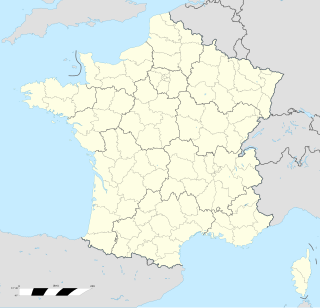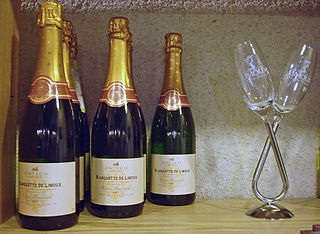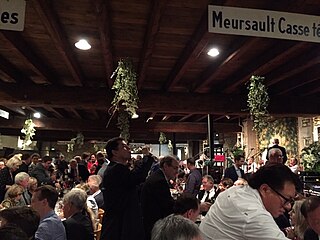Related Research Articles

A party is a gathering of people who have been invited by a host for the purposes of socializing, conversation, recreation, or as part of a festival or other commemoration or celebration of a special occasion. A party will typically feature food and beverages, and often music and dancing or other forms of entertainment. In many Western countries, parties for teens and adults are associated with drinking alcohol such as beer, wine, or distilled spirits.

Aude is a department in Southern France, located in the Occitanie region and named after the river Aude. The departmental council also calls it "Cathar Country" after a group of religious dissidents active in the 12th century.

Mâcon, historically anglicised as Mascon, is a city in east-central France. It is the prefecture of the department of Saône-et-Loire in Bourgogne-Franche-Comté. Mâcon is home to near 34,000 residents, who are referred to in French as Mâconnais. The city gave its name to the nearby vineyards and wine 'appellation'.

Burgundy wine is wine made in the Burgundy region in eastern France, in the valleys and slopes west of the Saône, a tributary of the Rhône. The most famous wines produced here—those commonly referred to as "Burgundies"—are dry red wines made from pinot noir grapes and white wines made from chardonnay grapes.
Les Marmitons is a gastronomic and social club of gentlemen who have a common interest in fine food, wine and the culinary arts. Through regular gatherings, members gain knowledge and experience in the preparation and presentation of various fine cuisines under the direction a recognized chef invited to lead the event.

Roquemaure is a small town and commune in the Gard department of southern France. The town lies 12 kilometres north of Avignon on the right bank of the Rhône. In the 2012 census the commune had a population of 5,421.

Limoux is a commune and subprefecture in the Aude department, a part of the ancient Languedoc province and the present-day Occitanie region in southern France. It lies on the river Aude about 30 km (19 mi) due south of Carcassonne. Its vineyards are famous for being first to produce sparkling wine known as Blanquette de Limoux.

Lidia Giuliana Matticchio Bastianich is an Italian-American celebrity chef, television host, author, and restaurateur. Specializing in Italian and Italian-American cuisine, Bastianich has been a regular contributor to public television cooking shows since 1998.

Languedoc-Roussillon wine, including the vin de pays labeled Vin de Pays d'Oc, is produced in southern France. While "Languedoc" can refer to a specific historic region of France and Northern Catalonia, usage since the 20th century has primarily referred to the northern part of the Languedoc-Roussillon région of France, an area which spans the Mediterranean coastline from the French border with Spain to the region of Provence. The area has around 700,000 acres (2,800 km2) under vines and is the single biggest wine-producing region in the world, being responsible for more than a third of France's total wine production. In 2001, the region produced more wine than the United States.
Puerto Vallarta International Gourmet Festival(The Festival Gourmet International Vallarta) is an annual culinary festival held in Puerto Vallarta, Mexico, every November since 1995. There were 35,000 visitors to the festival in 2006.

Limoux wine is produced around the city of Limoux in Languedoc in southwestern France. Limoux wine is produced under four Appellation d'origine contrôlée (AOC) designations: Blanquette de Limoux, Blanquette méthode ancestrale, Crémant de Limoux and Limoux, the first three of which are sparkling wines and dominate the production around Limoux. The main grape of the region is the Mauzac, locally known as Blanquette, followed by Chardonnay and Chenin blanc. In 2005, the Limoux AOC was created to include red wine production consisting of mostly Merlot. Wine historians believe that the world's first sparkling wine was produced in this region in 1531, by the monks at the abbey in Saint-Hilaire.

Aigues-Vives is a commune in the Aude department in the Occitanie region of southern France.
The Pinot noir passing-off controversy arose in 2010 within the wine industry over the passing-off by French distributors of Merlot and Syrah wine as Pinot noir in the United States. The controversy involved the mislabeling of wines from vintners in southern France which were falsely sold to American distributors E & J Gallo Winery as Pinot noir. The mislabeling resulted in a French court convicting twelve people for fraud.

La Paulée de Meursault is a lunch celebrating the end of the grape harvest in Burgundy, France. Originally, the celebration included only winemakers, cellar workers, and the surrounding community. It has since evolved to become an international wine event, and an integral part of Les Trois Glorieuses, which also includes a charity auction held at the Hospices de Beaune and a formal dinner at the Clos de Vougeot. Approximately 700 people attend the lunch, held in the Château de Meursault.
The World Gourmet Summit is an annual culinary event held annually in Singapore, which started in 1997. Its objective is to showcase dining in Singapore and promote local chefs while featuring Michelin-starred chefs and vintners from around the world. It is organised by A La Carte Productions, a division of Peter Knipp Holdings Pte Ltd (PKH), and supported by the Singapore Tourism Board (STB).
Crémant de Luxembourg is a sparkling wine from Luxembourg's Moselle district made according to the traditional method of sparkling wine production which includes a second fermentation in the bottle followed by nine months of maturation. Only grapes from the best local varieties are used. They must be perfectly healthy, fully ripened, and free of damage from crushing or transportation.
The Naples Winter Wine Festival is a multi-day charity wine festival featuring celebrity chef-hosted dinners and an auction. The event has been held yearly in Naples, Florida since 2001. Since its inception, the Naples Children & Education Foundation, founders of the Naples Winter Wine Festival has raised over $191 million for underprivileged and at-risk children in Collier County.

The Carnival of Limoux is an annual festival held in Limoux, Languedoc-Roussillon, France. It takes place for three months on the weekends between January and Mardi Gras and is conducted in Occitan, the area's traditional language.
Sieur d'Arques is a wine producer cooperative located in Limoux in the Languedoc-Roussillon area of France. It produces the Red Bicyclette brand of wine, marketed in the United States by E & J Gallo Winery.
Note by Note cuisine is a style of cooking based on molecular gastronomy, created by Hervé This. Dishes are made using pure compounds instead of using animal or plant tissues. Hervé This said the cuisine is like "a painter using primary colours, or a musician composing electroacoustic music, wave by wave, using a computer".
References
- ↑ "Limoux. Toques et Clochers : les enchères s'envolent". La Dépêche du Midi. Toulouse. 18 April 2011. Retrieved 19 October 2013.
- ↑ https://www.sieurdarques.com/toques-et-clochers,fr,8,59.cfm
- 1 2 Le limouxin, a newspaper published in Limoux, n°3273, 21 March 2008